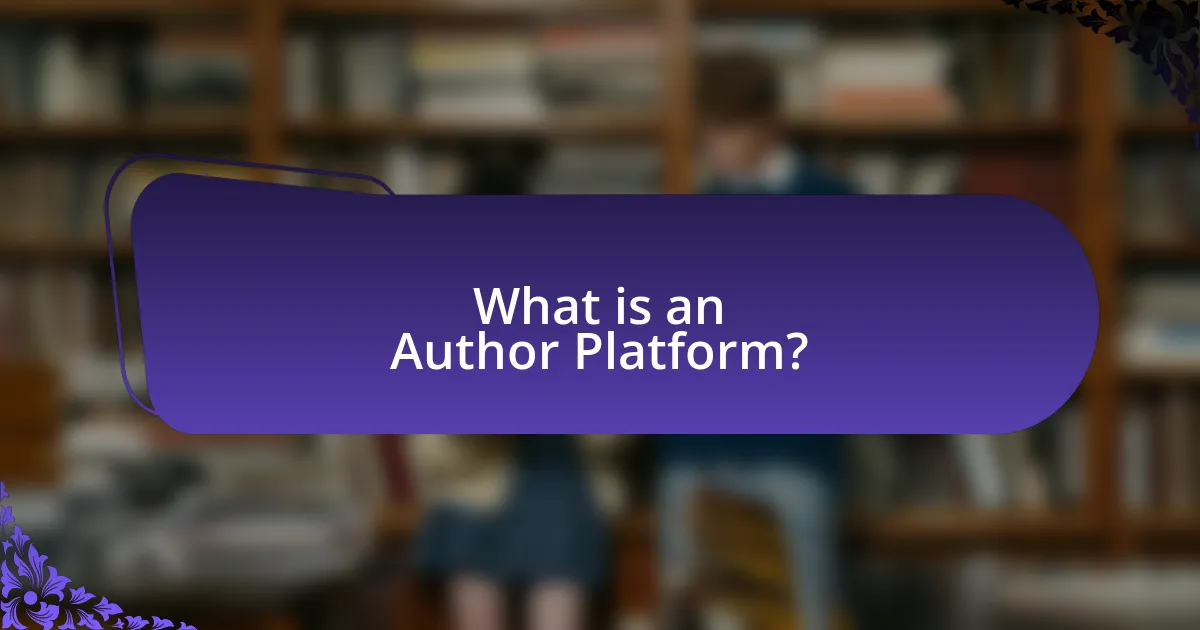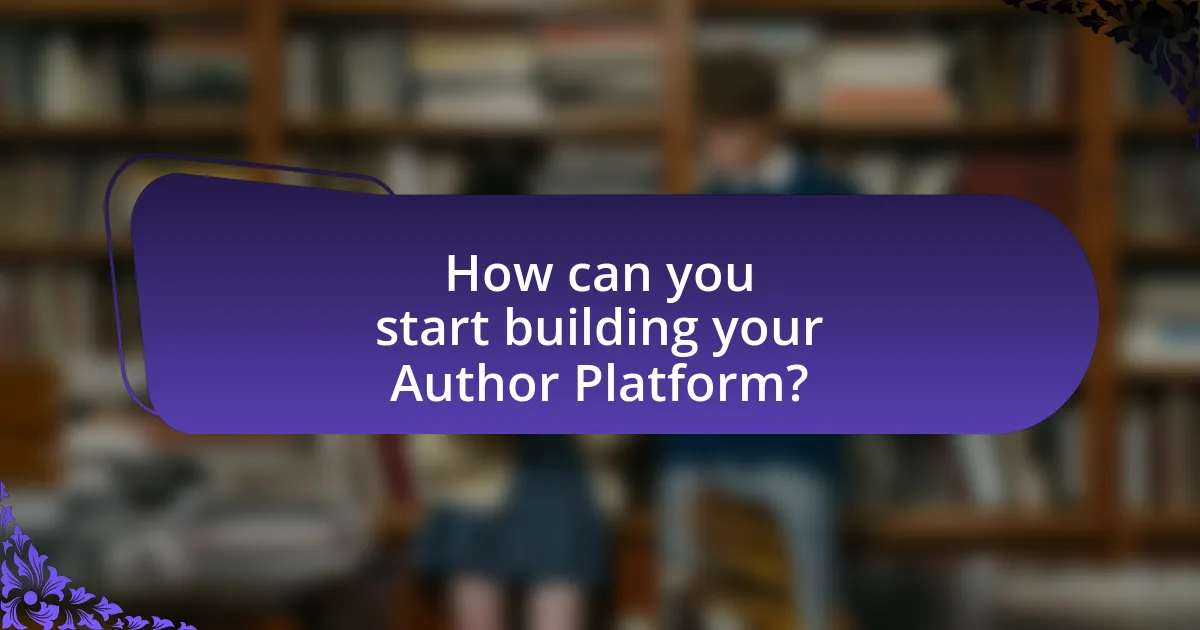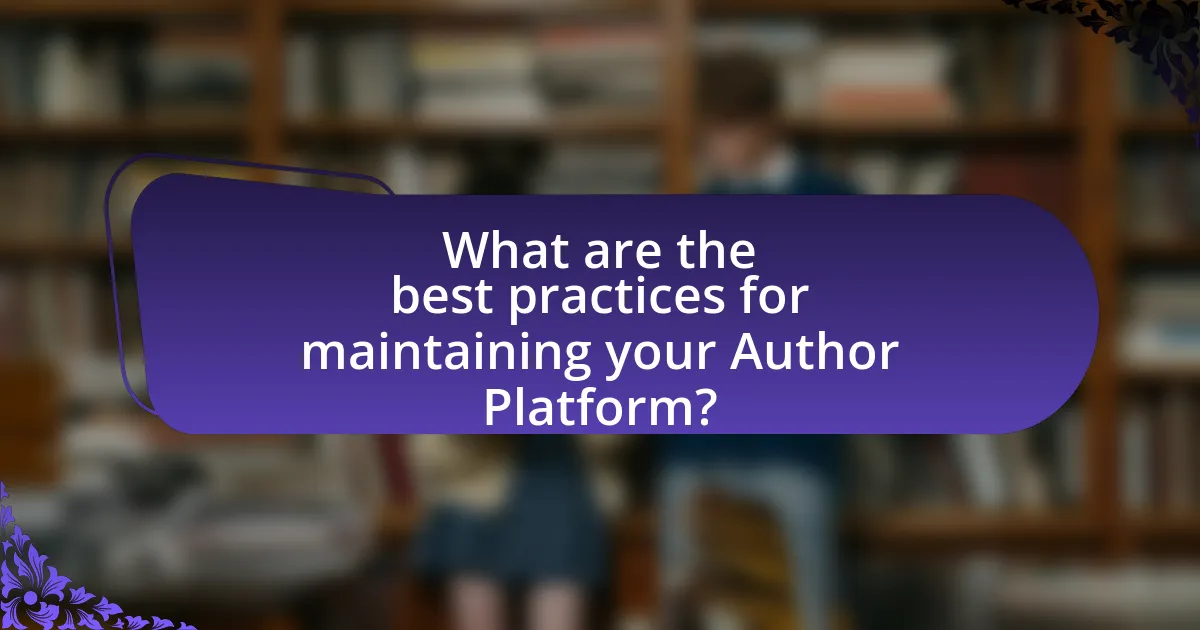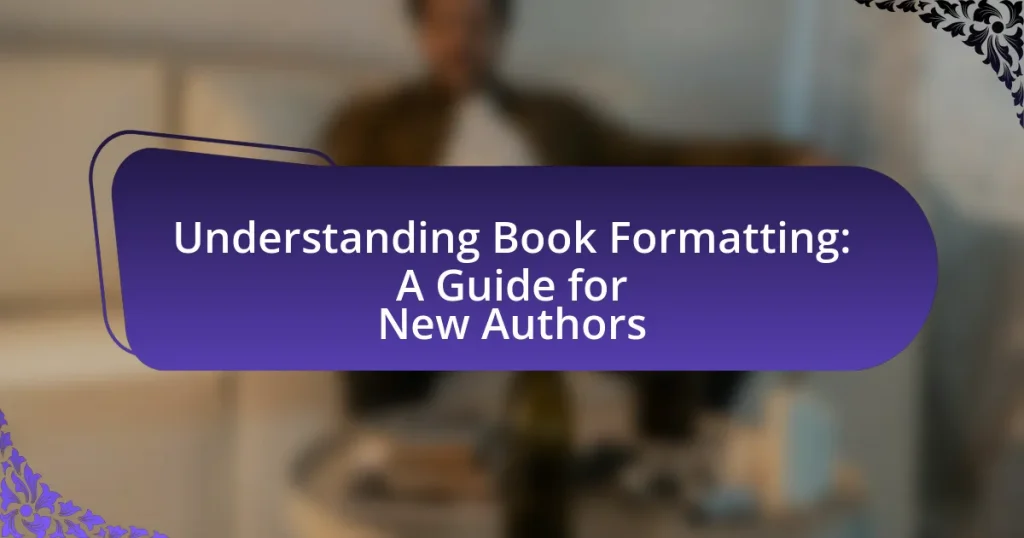An author platform is a vital collection of tools and strategies that authors utilize to promote their work and engage with readers, encompassing social media, personal websites, email newsletters, and public speaking. This article outlines the importance of an author platform for book launches, emphasizing how it enhances credibility, visibility, and reader engagement, ultimately leading to increased book sales. Key components of a successful author platform include a strong online presence, defined target audience, and effective engagement strategies. Additionally, the article provides practical steps for building and maintaining an author platform, including content creation, networking, and utilizing various tools to measure success while avoiding common pitfalls.

What is an Author Platform?
An author platform is a collection of tools, strategies, and audiences that an author uses to promote their work and engage with readers. It typically includes social media presence, a personal website, email newsletters, and public speaking engagements, all aimed at building a recognizable brand and fostering a community around the author’s writing. Research indicates that authors with a strong platform can significantly increase their book sales and visibility, as they have established relationships with potential readers and industry professionals.
Why is an Author Platform important for a book launch?
An Author Platform is crucial for a book launch because it establishes the author’s credibility and reach, directly influencing the book’s visibility and sales potential. A well-developed platform allows authors to connect with their target audience, creating a built-in readership that is more likely to purchase the book upon release. Research indicates that authors with a strong online presence can achieve up to 50% higher sales compared to those without one, as they can leverage social media, email lists, and personal websites to promote their work effectively. This direct engagement fosters a sense of community and loyalty among readers, which is essential for a successful launch.
How does an Author Platform influence reader engagement?
An author platform significantly influences reader engagement by establishing a direct connection between the author and their audience. This connection fosters trust and loyalty, as readers are more likely to engage with authors who actively communicate and share their insights, updates, and content. Research indicates that authors with a well-defined platform, including social media presence and a dedicated website, can increase their audience interaction by up to 50%, as these platforms provide avenues for readers to participate in discussions, share feedback, and feel part of a community. Consequently, a robust author platform not only enhances visibility but also cultivates a more engaged readership, ultimately leading to higher book sales and sustained interest in the author’s work.
What role does an Author Platform play in marketing strategies?
An Author Platform serves as a crucial foundation for marketing strategies by establishing an author’s visibility and credibility in the marketplace. This platform encompasses an author’s online presence, including social media, a personal website, and email newsletters, which collectively engage potential readers and build a loyal audience. Research indicates that authors with a well-defined platform can increase their book sales by up to 50%, as they can directly communicate with their audience and leverage their influence to promote their work effectively.
What are the key components of an Author Platform?
The key components of an Author Platform include a strong online presence, a defined target audience, and effective engagement strategies. A strong online presence is established through a professional website and active social media profiles, which serve as the foundation for an author’s visibility. Defining a target audience allows authors to tailor their content and marketing efforts to specific reader demographics, enhancing connection and relevance. Effective engagement strategies, such as newsletters, blog posts, and interactive social media content, foster relationships with readers and build a loyal following. These components collectively contribute to an author’s credibility and marketability, essential for a successful book launch.
How do social media profiles contribute to an Author Platform?
Social media profiles significantly contribute to an Author Platform by enhancing visibility and engagement with potential readers. These profiles allow authors to share their work, connect with their audience, and build a community around their writing. For instance, a study by the Pew Research Center indicates that 69% of adults in the U.S. use social media, providing authors with a vast audience to reach. Additionally, social media facilitates direct interaction, enabling authors to receive feedback and foster relationships, which can lead to increased book sales and a loyal readership.
What types of content should be included on an Author Platform?
An Author Platform should include a variety of content types such as blog posts, social media updates, newsletters, author bios, book excerpts, and multimedia elements like videos or podcasts. Blog posts allow authors to share insights, writing tips, and personal experiences, fostering engagement with readers. Social media updates help in building a community and promoting upcoming works. Newsletters keep subscribers informed about new releases and events. An author bio establishes credibility and connects with the audience. Book excerpts provide a taste of the author’s writing style, enticing potential readers. Multimedia elements can enhance engagement and reach a broader audience. These content types collectively contribute to a robust Author Platform, essential for successful book launches.

How can you start building your Author Platform?
To start building your Author Platform, create a professional website that showcases your work, provides a blog, and includes a mailing list sign-up. A website serves as a central hub for your audience, allowing you to share updates, engage with readers, and promote your books. According to a survey by the Author Marketing Club, 70% of authors believe that having a website is essential for their success, as it enhances visibility and credibility in the literary market.
What steps should you take to establish your online presence?
To establish your online presence, create a professional website and engage on social media platforms relevant to your audience. A professional website serves as a central hub for your content, showcasing your work and providing a means for readers to connect with you. Engaging on social media platforms like Twitter, Instagram, or Facebook allows you to interact with potential readers and build a community around your writing. According to a 2021 survey by the Author’s Guild, 80% of authors reported that having an online presence significantly increased their visibility and reader engagement.
How can you choose the right social media platforms for your audience?
To choose the right social media platforms for your audience, first identify where your target demographic spends their time online. Research indicates that different age groups and interests gravitate towards specific platforms; for instance, 71% of 18-29-year-olds use Instagram, while 69% of that age group also uses Snapchat. Understanding these statistics allows authors to align their presence with platforms frequented by their intended readers. Additionally, analyze the content format that resonates with your audience; for example, visual storytelling may thrive on Instagram, while in-depth discussions may be better suited for Facebook or LinkedIn. By matching your audience’s preferences with the characteristics of each platform, you can effectively engage and grow your readership.
What strategies can you use to create engaging content?
To create engaging content, utilize storytelling, audience interaction, and multimedia elements. Storytelling captivates readers by presenting relatable narratives, making the content memorable and emotionally resonant. Audience interaction, such as polls or questions, fosters a sense of community and encourages participation, which can increase engagement rates. Incorporating multimedia elements like images, videos, and infographics enhances visual appeal and aids in conveying complex information effectively. Research indicates that articles with images receive 94% more views than those without, highlighting the importance of visual content in engagement.
How can networking enhance your Author Platform?
Networking can significantly enhance your Author Platform by expanding your reach and increasing visibility among potential readers and industry professionals. Engaging with other authors, publishers, and influencers allows for collaborative opportunities such as guest blogging, joint promotions, and cross-promotion on social media, which can attract a wider audience. According to a survey by the Author’s Guild, 70% of authors reported that networking led to increased book sales and visibility. This demonstrates that building relationships within the literary community not only fosters support but also creates avenues for marketing and exposure that are crucial for a successful book launch.
What are effective ways to connect with other authors and influencers?
Effective ways to connect with other authors and influencers include participating in writing communities, attending literary events, and leveraging social media platforms. Engaging in online forums like Goodreads or joining local writing groups fosters relationships with peers. Attending book fairs, author signings, and workshops provides opportunities for face-to-face networking. Utilizing social media, particularly Twitter and Instagram, allows authors to interact with influencers by sharing insights, commenting on their posts, and collaborating on projects. Research indicates that 70% of authors find success in networking through these channels, highlighting their effectiveness in building connections.
How can attending events and workshops benefit your platform?
Attending events and workshops can significantly enhance your platform by providing networking opportunities, increasing visibility, and facilitating skill development. Networking at these events allows authors to connect with industry professionals, potential collaborators, and readers, which can lead to valuable partnerships and increased audience reach. For instance, a survey by the Author’s Guild found that 70% of authors who actively networked reported higher book sales compared to those who did not. Additionally, workshops often offer targeted training that can improve marketing strategies and writing skills, directly impacting the effectiveness of an author’s platform.

What are the best practices for maintaining your Author Platform?
To maintain an effective Author Platform, consistently engage with your audience through regular content updates, social media interactions, and email newsletters. This engagement fosters a loyal readership and keeps your audience informed about your work. Research indicates that authors who actively communicate with their audience see a 30% increase in reader engagement and book sales. Additionally, regularly updating your website with fresh content, such as blog posts or book-related news, enhances your visibility and search engine ranking, making it easier for potential readers to discover you.
How often should you update your content and engage with your audience?
You should update your content at least once a week and engage with your audience daily. Regular updates keep your content fresh and relevant, which is crucial for maintaining audience interest and improving search engine rankings. Engaging daily fosters a strong relationship with your audience, encouraging loyalty and interaction. Research indicates that consistent engagement can increase audience retention by up to 60%, highlighting the importance of both frequent content updates and daily audience interaction.
What tools can help you manage your Author Platform effectively?
To manage your Author Platform effectively, tools such as social media management software, email marketing platforms, and website builders are essential. Social media management tools like Hootsuite or Buffer allow authors to schedule posts, track engagement, and analyze performance across multiple platforms, enhancing visibility and interaction with readers. Email marketing platforms like Mailchimp or ConvertKit enable authors to build and maintain mailing lists, send newsletters, and automate communication, which is crucial for audience engagement and book promotion. Website builders such as WordPress or Wix provide authors with user-friendly interfaces to create professional websites that showcase their work, host a blog, and offer a platform for direct sales or reader interaction. These tools collectively streamline the management of an author’s online presence, making it easier to connect with readers and promote upcoming releases.
How can you measure the success of your Author Platform?
You can measure the success of your Author Platform by analyzing key performance indicators such as audience engagement, follower growth, and conversion rates. Audience engagement can be assessed through metrics like comments, shares, and likes on social media posts, indicating how well your content resonates with readers. Follower growth reflects the expansion of your reach and influence, which can be tracked through analytics tools on platforms like Twitter and Instagram. Conversion rates, which measure the percentage of visitors who take a desired action, such as signing up for a newsletter or purchasing a book, provide insight into how effectively your platform drives sales and builds a loyal readership. These metrics collectively offer a comprehensive view of your platform’s effectiveness in connecting with your target audience and achieving your goals.
What common mistakes should you avoid when building your Author Platform?
When building your Author Platform, avoid neglecting audience engagement, as this can lead to a lack of connection with potential readers. Engaging with your audience through social media, newsletters, and events fosters relationships that are crucial for a successful platform. Additionally, do not overlook the importance of consistent branding; inconsistent messaging can confuse your audience and dilute your identity as an author. Failing to utilize analytics to understand your audience’s preferences can also hinder your growth, as data-driven decisions are essential for effective marketing strategies. Lastly, avoid focusing solely on self-promotion; instead, provide value through content that resonates with your audience, as this builds trust and loyalty.
How can inconsistency affect your Author Platform’s credibility?
Inconsistency can significantly undermine your Author Platform’s credibility by creating confusion and distrust among your audience. When an author frequently changes their messaging, posting schedule, or branding elements, it leads to a lack of clarity about their identity and purpose. Research indicates that consistent branding can increase customer trust by up to 80%, highlighting the importance of a unified approach. Therefore, maintaining a steady and coherent presence across all platforms is essential for establishing and preserving credibility in the eyes of potential readers and followers.
What pitfalls should you be aware of in social media engagement?
In social media engagement, you should be aware of pitfalls such as inconsistency in posting, negative interactions, and lack of audience understanding. Inconsistency can lead to decreased audience engagement; for example, brands that post regularly see 67% more leads than those that do not. Negative interactions, including responding poorly to criticism, can damage your reputation and alienate potential readers. Additionally, failing to understand your audience’s preferences can result in irrelevant content, which studies show can decrease engagement rates by up to 50%.
What practical tips can help you build a successful Author Platform?
To build a successful Author Platform, focus on establishing a strong online presence through a professional website and active social media engagement. A professional website serves as the central hub for your brand, showcasing your work, providing a blog for content sharing, and offering a newsletter sign-up to capture email addresses. Active social media engagement on platforms like Twitter, Instagram, and Facebook allows authors to connect with readers, share insights, and promote their work, which is essential for audience growth. According to a survey by the Author Marketing Club, 70% of authors who actively engage on social media report increased book sales, demonstrating the effectiveness of these strategies in building a robust Author Platform.



